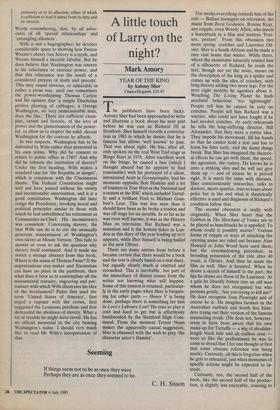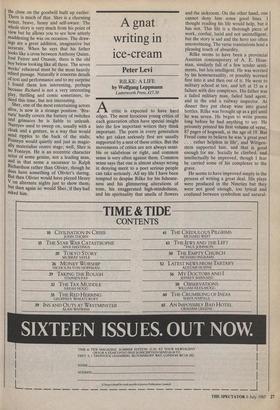A little touch of Larry on the night?
Mark Amory
YEAR OF THE KING by Antony Sher
ChattolHogarth, £10.95
The publishers have been lucky. Antony Sher had been approached to write and illustrate a book about his next part before he was cast as Richard III at Stratford. Sher himself records a conversa- tion in 1983 in which he denies that he is famous but allows 'well known' to pass. That was about right. He has, after all, only spoken on the real West End stage as Ringo Starr in 1974. After excellent work on the fringe, he caused a fuss (which I thought absurd but he appears to find reasonable) with his portrayal of a silent, intoxicated Arab in Goosepimples, had his moments opposite Bob Hoskins and a lot of toasters in True West at the National and a season at the RSC which included Tartuf- fe and a brilliant Fool to Michael Gam- bon's Lear. This was less seen than it should have been as he broke a tendon and was off stage for six months. In so far as he was even well known, it was as the History Man on television. But Richard was a sensation and is the hottest ticket in Lon- don as this diary of the year leading up to it appears, while Sher himself is being hailed as the new Olivier.
There are many entries from before it became certain that there would be a book and the text is clearly based on a real diary, but equally clearly much is omitted and retouched. This is inevitable, but part of the immediacy of diaries comes from the writer not knowing what will happen. Some of this tension is retained, particular- ly in the early pages when Sher is bargain- ing for other parts — Henry V is being done, perhaps there is something for him in Love's Labours Lost? He tries to play it cool and hard to get but is effortlessly bamboozled by the Stratford High Com- mand. From the moment Trevor Nunn makes the apparently casual suggestion, Sher is obsessed with the wish to play 'the character actor's Hamlet'. For weeks everything reminds him of the role — Belfast teenagers on television, the music from Boris Godunov, Ronnie Kray, any cripple, even Woody Allen, who meets a hunchback in a film and mutters 'Post- ure, posture'. From this obsession two more spring: crutches and Laurence Oli- vier. Sher is a South African and he made a rare visit home that winter. While there, where the mountains naturally remind him of a silhouette of Richard, he reads the text, though not yet the notes, muses on the description of the king as a spider and comes up with the idea of crutches, with long sleeves adding two more legs. For the next eight months he agonises about it. Watching The Living Planet he finds arachnid behaviour 'too lightweight'. People tell him he cannot be sexy on crutches. People tell him Richard was a warrior, who could not have fought if he had needed crutches. At early rehearsals he tells the long-suffering director, Bill Alexander, that they were a rotten idea. They impede his movement, fill his hands so that he cannot hold a text and has to learn his lines early, and the damn things break. But Sher has imagined the theatric- al effects he can get with them, the speed, the agression, the variety. He knows he is onto a striking idea and he will not give them up — and of course he is proved right. It is much the same with diseases. Sher conscientiously researches, talks to doctors, meets spastics, tries to learn about polio but in the end what is theatrically effective is used and diagnoses of Richard's condition follow that.
The second obsession is really with originality. When Sher hears that the Gobbos in The Merchant of Venice are to be played as hunchbacks he is appalled. To whom could it possibly matter? Various forms of cripple or ways of attacking the opening scene are ruled out because Alan Howard or John Wood have used them; but the overshadowing precedent, in brooding possession of the role after 40 years, is Olivier. And then he made the film as well. Sher is haunted. When he draws a sketch of himself in the part, the lips he draws are those of Sir Laurence. At a gala he literally bumps into an old man whom he does not recognised but who protests gently, 'Are you trying to kill me?' He does recognise Joan Plowright and of course he is. He imagines farmers in the Australian outback and South Sea Islan- ders trying out their version of the famous insinuating croak. (He does not, however, seem to have been aware that his own make-up for Tartuffe — a wig of shoulder- length black hair and an endless nose — were so like the performance he was to come to dread that I for one thought at first that some obscure reference was being made). Curiously, all this is forgotten when he gets to rehearsal, just when memories of specific actions might be expected to in- trude.
Curiously, too, the second half of the book, like the second half of the produc- tion, is slightly less enjoyable, coasting to
the close on the goodwill built up earlier. There is much of that. Sher is a charming writer, brave, funny and self-aware. The whole story is very much from his point of view but he allows you to see how utterly maddening he was on occasion. The draw- ings are a great addition, imaginative but accurate. When he says that his father looks like a cross between Anthony Quinn, Jose Ferrer and Onassis, there is the old boy below looking like all three. The seven weeks' rehearsal must be the most heavily edited passage. Naturally it concerns details of text and performance and to my surprise I found them less interesting, perhaps because Richard is not a very interesting Play, thrilling and comic sometimes, in- deed this time, but not interesting. Sher, one of the most entertaining actors alive, is now in a strange position. 'Bra- vura' hardly covers the battery of twitches and grimaces he is liable to unleash. Nureyev used to sweep on, usually with a Cloak and a gesture, in a way that would send ripples to the back of the stalls; Fonteyn would quietly and just as magic- ally materialise centre stage; well, Sher is no Fonteyn. He is an eccentric character actor of some genius, not a leading man, and in that sense a successor to Ralph Richardson rather than Olivier, though he does have something of Olivier's daring. But then Olivier would have played Henry V on alternate nights just to show them; but then again so. would Sher,', if they had asked him.



















































 Previous page
Previous page